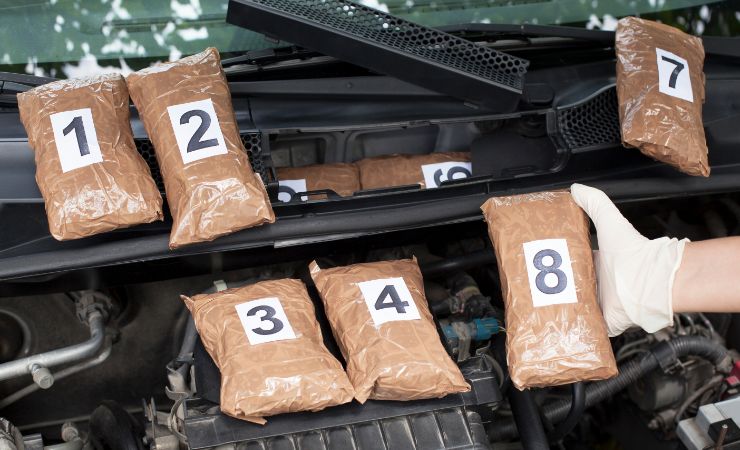Staten Island Drug Importation & Exportation Lawyer

Staten Island Drug Importation & Exportation Attorney
Both the importation and exportation of controlled substances across country borders are illegal. Because it involves country borders, it is a federal charge, which carries more severe penalties than state charges. If you are facing drug importation or exportation charges, it’s essential to your future to begin working with a skilled drug crime lawyer to lower the severity of your sentence or avoid conviction.
The Vitaliano Law Firm: Your Staten Island Drug Importation and Exportation Lawyers
Drug exportation and importation cases are serious and carry with them mandatory prison sentences and fines. A conviction can impact the rest of your life, affecting such elements as education, housing, and job opportunities. It’s important that you quickly contact a drug crimes attorney who defends those charged with crimes including drug possession, manufacturing, trafficking, and more.
At The Vitaliano Law Firm, we have experience as prosecutors, meaning we understand how they work and the tactics they use. This gives us an advantage when creating your defense, as we can draw on our years of experience. We aim to tailor our legal representation to your needs to provide you with a better chance of avoiding conviction.
Drug Importation and Exportation Laws
Controlled substance importation and exportation means moving controlled substances, dangerous chemicals, prescription drugs, and other drugs in and out of the US without legal authorization. This is often done with the intention of selling the drug in or out of the US.
The severity of the charge and penalty depends on the type of drug and how much of it was involved in importation or exportation. If there are large amounts of drugs being imported or exported with the intention of commercial sale, the person will likely also face distribution or trafficking charges.
What Is a Controlled Substance?
Controlled substances are any substance or chemical regulated under federal law. Controlled drugs and substances are classified into five schedules based on medical uses and the potential for abuse of a drug:
- Schedule I. These are drugs that have a high potential for abuse and have no currently accepted medical uses. This includes drugs such as LSD, MDMA or ecstasy, marijuana, heroin, and peyote.
- Schedule II. This schedule of drugs is considered dangerous and has a high potential for misuse and physical or psychological dependence. This includes drugs such as cocaine, methamphetamine, oxycodone, fentanyl, and methadone.
- Schedule III. These drugs have a moderate to low potential for dependence. This includes ketamine, anabolic steroids, and testosterone.
- Schedule IV. These substances have a low risk of misuse and dependence. It includes drugs such as Xanax, Ambien, Valium, and Ativan.
- Schedule V. This schedule of drugs has the lowest potential for misuse and includes Parepectolin, Motofen, and Lomotil.
Why Do I Need a Drug Importation and Exportation Defense Attorney?
Federal drug charges come with serious punishments, including mandatory prison time and severe fines. Conviction of importation and exportation crimes can impact the rest of your life, and working with a Staten Island drug importation and exportation lawyer is the most effective way of combating those effects.
Federal agencies have significantly more resources than you do, and if you enter your drug importation and exportation case without an attorney, you can expect penalties to harm your entire future. When you are represented by a skilled attorney, you are aware of the legal options that can be taken to reduce or eliminate your penalties. An attorney may even find a defense to help you avoid conviction.
Penalties for Conviction of Drug Importation and Exportation Charges
To be convicted for a drug importation or exportation charge, it must be proven that the act was unlawful and done knowingly. The penalties for conviction differ based on the case’s circumstances, like a prior criminal record and the amount of a substance.
Importing or exporting a chemical for manufacturing or with reasonable cause to believe it will be used in manufacturing a controlled substance faces a sentence of up to 20 years in prison. Trafficking a Schedule V drug has a maximum jail time of one year and fines of up to $100,000.
Trafficking of certain amounts of Schedule I or II substances results in a mandatory minimum sentence of five years of incarceration and a fine of up to $5 million for individuals and $25 million for non-individuals. This includes trafficking 500 to 4,999 grams of cocaine mixture, 40 to 399 grams of fentanyl mixture, and 100 to 999 grams of heroin mixture.
Trafficking greater amounts of any of these substances results in a mandatory minimum sentence of 10 years of incarceration. You might also have up to $10 million in fines. Substances include 5 kilograms or more of cocaine mixture, 10 grams or more of LSD mixture, and 50 or more grams of pure methamphetamine.
Drug Crimes FAQs
Q: What Is the Statute of Limitations on Drug Charges in NY?
A: In New York, most misdemeanors have a statute of limitations of two years, and felonies have a five-year statute. If the drug charge is labeled a class A felony, there is no statute of limitations, meaning that you can be charged with it at any time. The class of the charge and whether it is a felony or misdemeanor depends on the type of drug charge, such as sale, possession, or trafficking. It also depends on the type of drug and the amount involved in the charge.
Q: What Is the Federal Drug Importation Law?
A: The federal law that regulates drug importation and exportation makes it illegal to move controlled substances in or out of the country without authorization. Substances include chemicals, drugs, and even prescription drugs. Doing so is a federal crime and carries serious penalties.
Q: What Is Criminal Possession of a Controlled Substance in the 5th Degree in NY?
A: Under the New York penal code, criminal possession of a controlled substance in the fifth degree is when an individual unlawfully and knowingly possesses a drug or controlled substance with the intention to sell it. This is classified as a class D felony, which carries a maximum of seven years of incarceration.
Q: What Is Criminal Possession of a Controlled Substance 7th Degree NY?
A: Under the New York penal code, criminal possession of a controlled substance in the seventh degree is when someone unlawfully and knowingly possesses a drug or controlled substance. However, it is a small enough amount that it is not considered a felony. Instead, it is a class A misdemeanor.
Criminal Defense for Drug Importation and Exportation
When you need exceptional and dedicated legal defense, contact The Vitaliano Law Firm.
Testimonials






